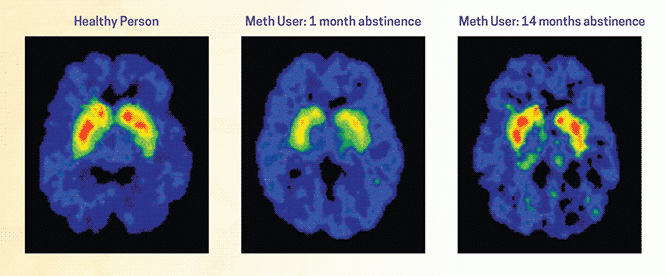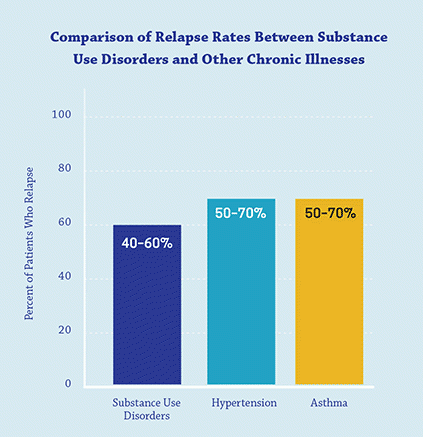source:
https://nida.nih.gov/publications/drugs-brains-behavior-science-addiction/treatment-recoverynote:
see the source document for links and moreDrugs, Brains, and Behavior: The Science of Addiction -- Treatment and RecoveryCan addiction be treated successfully?Yes, addiction is a treatable disorder. Research on the science of addiction and the treatment of substance use disorders has led to the development of research-based methods that help people to stop using drugs and resume productive lives, also known as being in
recovery.
Can addiction be cured?Like treatment for other chronic diseases such as heart disease or asthma, addiction treatment is not a cure, but a way of managing the condition. Treatment enables people to counteract addiction's disruptive effects on their brain and behavior and regain control of their lives.
 These images showing the density of dopamine transporters in the brain illustrate the brain's remarkable ability to recover, at least in part, after a long abstinence from drugs—in this case, methamphetamine.Does relapse to drug use mean treatment has failed?No
These images showing the density of dopamine transporters in the brain illustrate the brain's remarkable ability to recover, at least in part, after a long abstinence from drugs—in this case, methamphetamine.Does relapse to drug use mean treatment has failed?No. The chronic nature of addiction means that for some people relapse, or a return to drug use after an attempt to stop, can be part of the process, but newer treatments are designed to help with relapse prevention. Relapse rates for drug use are similar to rates for other chronic medical illnesses. If people stop following their medical treatment plan, they are likely to relapse.
 Relapse rates for people treated for substance use disorders are compared with those for people treated for high blood pressure and asthma. Relapse is common and similar across these illnesses. Therefore, substance use disorders should be treated like any other chronic illness. Relapse serves as a sign for resumed, modified, or new treatment.
Relapse rates for people treated for substance use disorders are compared with those for people treated for high blood pressure and asthma. Relapse is common and similar across these illnesses. Therefore, substance use disorders should be treated like any other chronic illness. Relapse serves as a sign for resumed, modified, or new treatment.Treatment of chronic diseases involves changing deeply rooted behaviors, and relapse doesn’t mean treatment has failed. When a person recovering from an addiction relapses, it indicates that the person needs to speak with their doctor to resume treatment, modify it, or try another treatment.
While relapse is a normal part of recovery, for some drugs, it can be very dangerous—even deadly. If a person uses as much of the drug as they did before quitting, they can easily overdose because their bodies are no longer adapted to their previous level of drug exposure. An overdose happens when the person uses enough of a drug to produce uncomfortable feelings, life-threatening symptoms, or death.
What are the principles of effective treatment?Research shows that when treating addictions to opioids (prescription pain relievers or drugs like heroin or fentanyl), medication should be the first line of treatment, usually combined with some form of behavioral therapy or counseling. Medications are also available to help treat addiction to alcohol and nicotine.
Additionally, medications are used to help people detoxify from drugs, although detoxification is not the same as treatment and is not sufficient to help a person recover. Detoxification alone without subsequent treatment generally leads to resumption of drug use.
For people with addictions to drugs like stimulants or cannabis, no medications are currently available to assist in treatment, so treatment consists of behavioral therapies. Treatment should be tailored to address each patient's drug use patterns and drug-related medical, mental, and social problems.
|
| Discoveries in science lead to breakthroughs in drug use treatment.
|
What medications and devices help treat drug addiction?Different types of medications may be useful at different stages of treatment to help a patient stop abusing drugs, stay in treatment, and avoid relapse.
- Treating withdrawal. When patients first stop using drugs, they can experience various physical and emotional symptoms, including restlessness or sleeplessness, as well as depression, anxiety, and other mental health conditions. Certain treatment medications and devices reduce these symptoms, which makes it easier to stop the drug use.
- Staying in treatment. Some treatment medications and mobile applications are used to help the brain adapt gradually to the absence of the drug. These treatments act slowly to help prevent drug cravings and have a calming effect on body systems. They can help patients focus on counseling and other psychotherapies related to their drug treatment.
- Preventing relapse. Science has taught us that stress cues linked to the drug use (such as people, places, things, and moods), and contact with drugs are the most common triggers for relapse. Scientists have been developing therapies to interfere with these triggers to help patients stay in recovery.
Common medications used to treat drug addiction and withdrawalOpioid* Methadone
* Buprenorphine
* Extended-release naltrexone
* Lofexidine
Nicotine* Nicotine replacement therapies (available as a patch, inhaler, or gum)
* Bupropion
* Varenicline
Alcohol* Naltrexone
* Disulfiram
* Acamprosate
How do behavioral therapies treat drug addiction?Behavioral therapies help people in drug addiction treatment modify their attitudes and behaviors related to drug use. As a result, patients are able to handle stressful situations and various triggers that might cause another relapse. Behavioral therapies can also enhance the effectiveness of medications and help people remain in treatment longer.
- Cognitive-behavioral therapy seeks to help patients recognize, avoid, and cope with the situations in which they're most likely to use drugs.
- Contingency management uses positive reinforcement such as providing rewards or privileges for remaining drugfree, for attending and participating in counseling sessions, or for taking treatment medications as prescribed.
- Motivational enhancement therapy uses strategies to make the most of people's readiness to change their behavior and enter treatment.
- Family therapy helps people (especially young people) with drug use problems, as well as their families, address influences on drug use patterns and improve overall family functioning.
- Twelve-step facilitation (TSF) is an individual therapy typically delivered in 12 weekly session to prepare people to become engaged in 12-step mutual support programs. 12-step programs, like Alcoholic Anonymous, are not medical treatments, but provide social and complementary support to those treatments. TSF follows the 12-step themes of acceptance, surrender, and active involvement in recovery.
|
| Treatment must address the whole person.
|
How do the best treatment programs help patients recover from addiction?Stopping drug use is just one part of a long and complex recovery process. When people enter treatment, addiction has often caused serious consequences in their lives, possibly disrupting their health and how they function in their family lives, at work, and in the community.
Because addiction can affect so many aspects of a person's life, treatment should address the needs of the whole person to be successful. Counselors may select from a menu of services that meet the specific medical, mental, social, occupational, family, and legal needs of their patients to help in their recovery.
For more information on drug treatment, see
Principles of Drug Addiction Treatment: A Research-Based Guide, and
Principles of Adolescent Substance Use Disorder Treatment: A Research-Based Guide.








